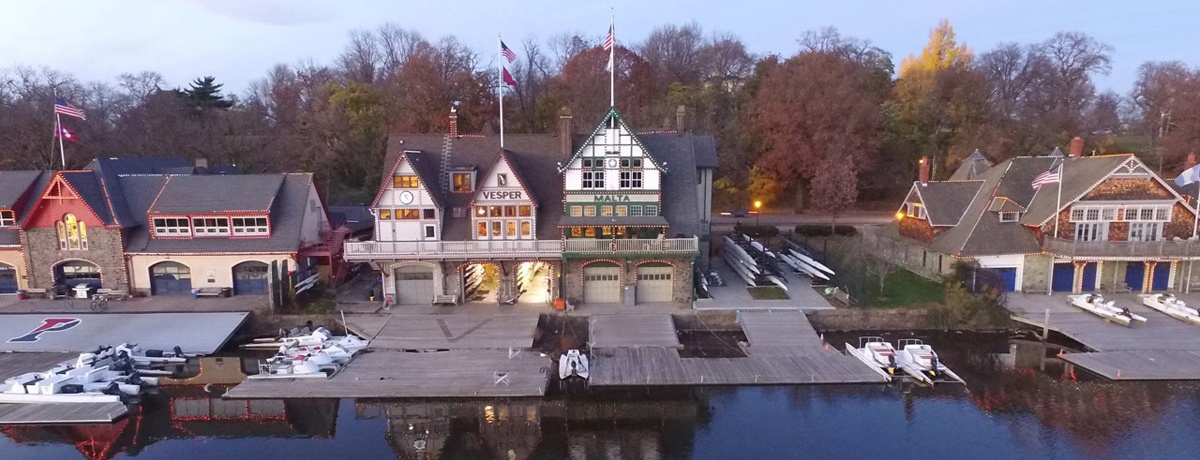
Mission Statement
The mission of Vesper Boat Club is to perpetuate its legacy of developing highly skilled and competitive rowers at all levels by providing its diverse community of members with premier rowing programs and first-class facilities and equipment.
The club motto, ‘ALL TOGETHER’ symbolizes an organization open to all people who want to row, and promotes character development and physical fitness through the challenge of the sport.
Vesper — A Brief History
The Vesper Boat Club had its beginning on Feb. 22, 1865– a decade into the flourishing of rowing clubs on Philadelphia’s Schuylkill River– with the founding of the Washington Barge Club. Five years later, on Jan 1, 1870, it changed its name to Vesper Boat Club and quickly became one of the most celebrated rowing clubs in the United States and the world. It has always been central to the Philadelphia rowing story.
Vesper’s eight-oared shell took the gold medal in Paris in 1900 at the first Olympics rowing regatta. The Vesper eight repeated its victory at the 1904 games in St. Louis. And at the 1964 Tokyo Olympics, Vesper eight won again, making it the only rowing club in the United States to win the title three times.
Perhaps the best known names associated with the Vesper Club, are John B. Kelly Sr., an Irish brickworks owner who became influential in city politics and his son, John B. Kelly Jr., a city councilman and brother to Princess Grace of Monaco.
Kelly Sr. won Olympic Gold in the single scull in 1920. He also won gold medals in the double scull in 1920 and in 1924, both times with his cousin Paul Costello. But, as a laborer Kelly was barred from entering the Diamond Sculls at the Royal Henley Regatta. It was two decades later, that John B. Kelly Jr. would win that event, in 1947 and 1949. Kelly Jr. won the national singles championship eight times. At the time of his death in 1985, he. was president of the United States Olympic Committee.
Under the coaching of such greats as Jim Manning, Dr. Charles W. Riggall, Allan Rosenberg and Dietrich Rose, many other Vesper members have gone on to cumulatively win more national and international races than any club in the United States.
Vesper's Clubhouse
The present clubhouse was constructed in combination with neighboring Malta, with the Vesper cornerstone dated 1865. The first building was completed in 1865, and the second boat bay addition in 1898. The John B. Kelly Addition was built in 1964, and in the late 1990's replaced when the club underwent a major renovation, being completed in 1998.
The boathouse was designed by noted Philadelphia architect, G.H.Hewitt. The architecture, semi-attached ornamental Victorian Gothic, is typical of that period and members who were tradesmen constructed the original building with local building materials.
Women's Rowing
After a century of accomplishments for the men, Vesper in 1970 became the first men’s club to organize a women’s rowing team (Philadelphia Girls Rowing Club, in 1938, pioneered women’s rowing in the United States). Vesper women have consistently won national championships and have regularly represented the United States in international competition. At the Montreal Olympics in 1976, six Vesper members were on the USA Olympic Rowing Team.
More Vesper Legends
John DuGene and William Nelson rowed for Vesper on the 1978 Men’s Lightweight team that went to Copenhagen for the FISA Lightweight Championships. They were the Team Alternates/”Spare Pair” for the 4- which also came from Vesper (Gribbin, Bater, Bohlin, Lewis). 6 of the 9 team members that year came from Vesper. The 1x was Bill Beldon and the 2x was Stan Depman and Fred Duling. They were not from Vesper. The coach that year, John Bannan, also was from Vesper.
Paul Costello, winner of the double sculls in 1920-1924 and 1928 and numerous national and Canadian championships. (Also rowed for Penn AC)
Joe Toland, Vince Deeney and cox, Joe MacIntyre, represented US in the coxed pair in the 1948 Olympic games. Toland later coached at St. Josephs and both won many championships. Toland rowed behind Knecht in the Pan American Gold 8 in Mexico City
Bill Knecht won many championships as a sculler and sweep including Tokyo 8 (in No.7). Sculled in Rome with Jack Kelly Jr. in the double and many other noteworthy achievements.
Jim Manning — coach in 1953-1961. Coached the Navy plebes at the academy. They later won 52 consecutive races including the 52 Olympic Gold. Coached Kelly in the single from 1952 on. Took the Brown and Nichols schoolboy 8 to Henley to win the ladies plate as the first American school boy crew to do that.
Vesper 8 (1958) won Canadian Henley in record time and placed 2nd in European championships in Poland: Kelly, Knecht, Hermann, Coleman, Ignas, Heffernan Halloran, Wilmerding, cox Rosenberg.
Frank Muller— coach of the 1900 Paris 8 and later at Yale. Coached from a single riding off the bow.
Harry Parker-Pan American and Olympic sculler (bronze 1960) — later coach at Harvard.
Bob Zimonyi, cox of the Tokyo 8 and winner of bronze in coxed pair in London Olympics 1948.
Dickie Mahan, lightweight sculler from East Falls section of Philadelphia, and one of the best in the US for many years. Rowed quadruples and doubles winning many races.
The 1900 Paris eight. These were the best scullers in Philadelphia including Harry De Baecke, Jim Juvenal, Lockwood and others.